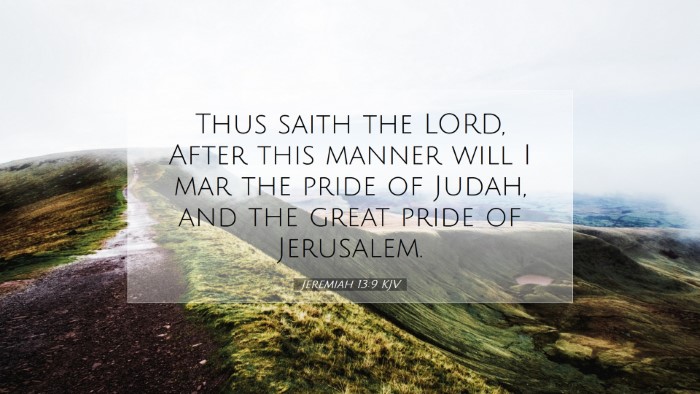Commentary on Jeremiah 13:9
The verse Jeremiah 13:9 states:
"Thus says the Lord: 'In this manner I will ruin the pride of Judah and the great pride of Jerusalem.'" (Jeremiah 13:9, ESV)
Context and Historical Background
The Book of Jeremiah is a pivotal text in the Old Testament, capturing the prophetic ministry of Jeremiah during the last days of the Kingdom of Judah. This period was marked by upheaval, moral decline, and a looming Babylonian threat. Jeremiah's prophecies often addressed the nation's infidelity to God and the dire consequences of their pride and rebellion.
Understanding the Imagery
In this verse, God employs illustrated imagery—utilizing the symbolism of a ruined belt (as seen in the previous verses)—to signify the spiritual state of Judah and Jerusalem. The pride referenced here is not merely a trait but a characteristic inherent in the very fabric of the people, showing their deviation from humble reliance on God.
Commentary Insights
Matthew Henry's Commentary
Spiritual Decline: Henry emphasizes that the pride of Judah and Jerusalem reflects their inner moral corruption. He links this state of arrogance with their failure to follow divine guidance, leading them to seek their own ways rather than adherence to God's commands.
Divine Judgment: According to Henry, God’s pronouncement that He will ruin this pride serves as a warning about the impending judgment. The consequences of pride not only affect individuals but can lead to national disaster, and Jeremiah’s role is to call the people to humility and repentance.
Albert Barnes' Notes on the Whole Bible
Significance of 'Pride': Barnes expands on the notion of pride, elaborating that this particular sin leads to a broad array of transgressions. He articulates that pride can manifest in disdain for God’s commands and an overestimation of one’s own righteousness.
Historical Fulfillment: Barnes also notes that the destruction of pride is directly linked to the historical events of Judah's downfall. The capture and exile under Babylon were not merely political events but were seen by the prophets as the culmination of divine displeasure with persistent sin and pride.
Adam Clarke's Commentary
Symbolism in Prophecy: Clarke remarks on the profundity of declaring ruin upon pride. He connects this to a broader theme in Scripture where God resists the proud but gives grace to the humble (James 4:6). This underlines the dichotomy between human pride and divine holiness.
Call to Repentance: Clarke highlights that the call to repent from pride is universal. He interprets Jeremiah's message not just as a warning for Judah but as a valid admonition for all who harbor pride in their hearts, urging a posture of humility before God.
Theological Reflections
This verse reinforces crucial theological themes found throughout Scripture:
- The Nature of God: His holiness demands a response from His people. Divine judgment is a recurring theme directed at those who fail to repent from pride and sin.
- The Human Condition: Pride is a fundamental flaw in humanity that leads to separation from God. It is essential for believers to recognize this tendency and strive against it.
- The Promise of Restoration: While judgment is pronounced, there is an underlying promise of restoration for those who turn back to God in humility and faith.
Application for Today
For pastors, students, theologians, and Bible scholars, the implications of Jeremiah 13:9 are profound:
- Preaching Themes: This verse can serve as a foundation for sermons focused on the dangers of pride and the necessity of humility in leadership and congregation life.
- Personal Reflection: Individuals in ministry should regularly assess their own hearts for pride, allowing the Scripture to penetrate deeply and promote genuine humility.
- Community Evaluation: Churches can reflect on collective attitudes of pride, fostering environments where vulnerability and shared accountability are encouraged.
Conclusion
Jeremiah 13:9 presents a poignant warning against the perils of pride and serves as an urgent call to humility. The insights drawn from the public domain commentaries illuminate its significance in historical context and applicability for contemporary believers. As we delve into this verse, let us heed the call to forsake pride and return to a place of humble reliance upon God.


